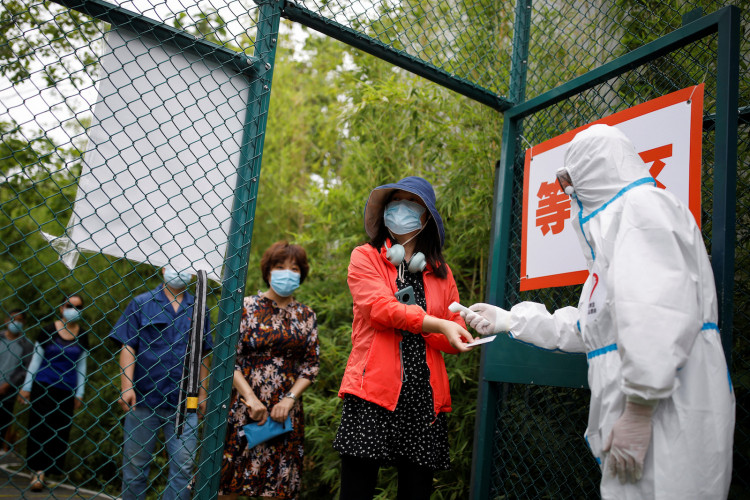The Beijing Health Commission reported on Thursday that 13 new COVID-19 cases were detected on Wednesday. This brought the total of new infections to 269. Of the 13 new cases, 12 were linked to Xinfadi, a large wholesale market in Fengtai District that the epicenter of this coronavirus cluster discovered on June 11. Before that, Beijing reported zero local transmissions for 56 days.
In the past two weeks, the number of local testing institutes has risen from 98 to 128. They provide coverage to 2422 sample-collection sites across Beijing. Additionally, Beijing has rapidly improved its capacity for nucleic acid testing from 40,000 per day to 300,000 per day.
On June 23, 14 automated, mobile and high-throughput nucleic acid testing devices officially launched operation in a stadium center in Daxing District, Beijing. It's Beijing's first inflatable COVID-19 testing laboratory, named as "Huoyan", consisted of 9 air-inflated chambers. The laboratory can meet testing needs of 30,000 people daily, with a single device testing 90 samples at a time.
Diqing Tibetan autonomous prefecture in Yunnan casts off poverty
On June 24, the Yunnan provincial government announced through a media conference that Diqing Tibetan autonomous prefecture was officially lifted from poverty list. Officials credited China's ongoing endeavors to eradicate extreme poverty by 2020 for 147 villages in the prefecture removed from the classification of extreme poverty.
From 2015 to 2019, the poverty-stricken population in Diqing was reduced from 74,139 to 1,579 people. The headcount ratio dropped from 24.95 percent to 0.53. Meanwhile, In 2019, per-capita annual income in Diqing's poverty-stricken population fields was up to 12,955 yuan (US$1830 dollars) and the total economic output value has increased by 10.7%, which ranks it high among the ten Tibetan autonomous prefectures.
As a major battlefield of the national poverty alleviation efforts, Yunnan had 88 poverty-stricken counties registered in 2016. Early this year, Yunnan launched a 100-day campaign against poverty, aimed to alleviate the remaining poverty-stricken areas by the end of June of 2020. According to Yunnan Daily, by June 13, there were 9 poverty-stricken counties, 429 poverty-stricken villages and a population of 442, 000 poverty-stricken individuals remaining on the list.
Beijing police intercepts psychedelic express delivery
Beijing police detected an express delivery of a psychedelic drug, Lysergic Acid Diethylamide (LSD) in Changping District. The drug is dosed in small pieces of blotting papers soaked in liquid LSD, a.k.a LSD stamps. The police suspected it is sourced from abroad, yet the final conclusion will be delivered after the completion of further investigation.
Targeted at teenagers, the initial price per LSD stamp cost RMB80 (US$11.3 dollars) but the market price could be as high as RMB250 (US$35.32 dollars) through several rounds of resale. LSD stamps differ from traditional drugs. Instead of taking orally, LSD stamp form of the drug can be absorbed into body by sticking it to skin. Law enforcement officials said that the high provided by LSD is much greater than marijuana, meanwhile the depression once drug effect diffuses is also severe.
Through May to the present this year, Beijing police have arrested over 100 suspects for drug-related crime and these drug busts saw authorities seize more than 22kg of various drugs.
U.K. Approves Huawei photonics research base
On June 25, South Cambridgeshire parliament approved Chinese telecommunications giant Huawei's construction plans for its research center based in Sawston, a small village near Cambridge. The center would play the role of research and development in the field of photonics, the study of lasers and fiber optics, that would be applied in Britain's 5G broadband network. Huawei has been operating in Britain for 20 years with 1,600 employees at present.
The phase-1 plan would occupy 9 acres with an investment of GBP£1 billion and is expected to bring an additional 400 jobs. The plans kicked off in 2017 when Huawei sought locations for a photonics research base. In 2018, Huawei completed the acquisition of the 500-acre site in South Cambridgeshire. In early 2019, Huawei launched the application process for construction plans.
Early this year, the the U.K. decided to allow Huawei to proceed with the construction of 5G mobile networks but with strict limits, especially in the field of the Radio Access Network (RAN). The U.K. limited Huawei's presence to a hard cap of 35% of the market.
China extends national relief for enterprises on social security insurance
The Ministry of Human Resources and Social Security, the Ministry of Finance and the State Administration of Taxation recently published a notification document regarding further relieving economic burdens during the COVID-19 pandemic through reduction of social insurance fees.
For small- and medium-scaled enterprises, the reduction and exemption policies of basic endowment insurance, unemployment insurance and injury insurance will be extended till the end of 2020. For large-scaled enterprises, state-owned firms not included, the reduction and exemption policies will be extended till the end of June 2020. Those enterprises severely hit by the COVID-19 pandemic can withhold social insurance payments without incurring penalty fees.





